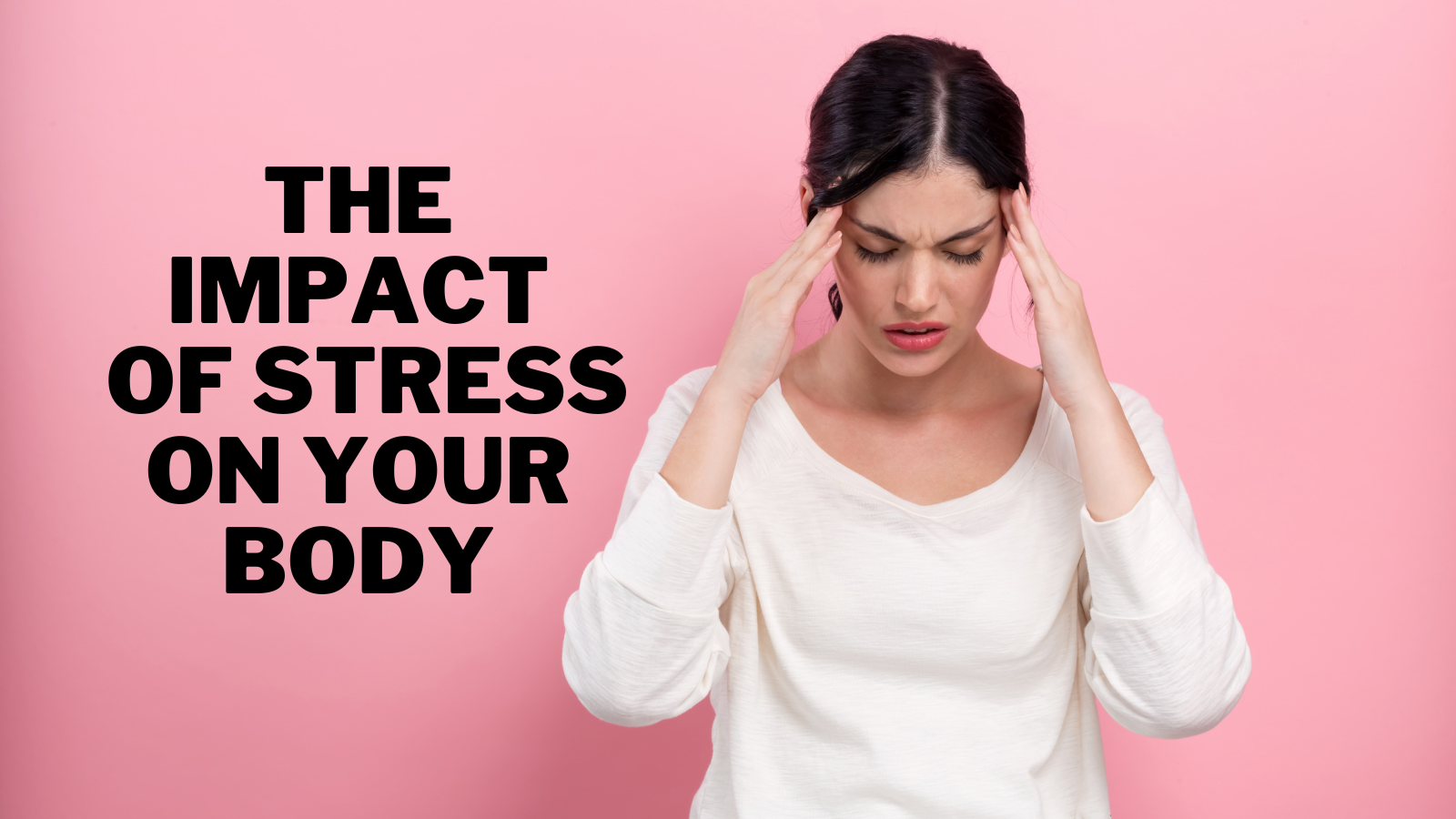The Impact Of Stress On Your Body
The Impact Of Stress On Your Body
Stress is a natural response to challenging situations but can hurt your body when it becomes chronic.
Stress can affect your physical, mental and emotional health and manifest in various ways, including headaches, fatigue, muscle tension, and even disease.
This blog post will explore the impact of stress on your body and discuss strategies for managing and reducing stress to improve your overall health and well-being.
What Are The Common Stress Symptoms?
Stress can manifest in various ways, and people may experience different symptoms. However, some common stress symptoms include:
1. Physical Symptoms
Headaches, muscle tension, fatigue, chest pain, and rapid heartbeat are common physical stress symptoms. Stress can also lead to changes in appetite, such as overeating or not eating enough.
2. Emotional Symptoms
Stress can affect your mood, leading to anxiety, irritability, and depression. Stress can also make it difficult to concentrate and cause feeling overwhelmed and helpless.
3. Behavioural Symptoms
Stress can cause changes in behaviour, such as sleeping too much or too little, withdrawing from social activities, and engaging in unhealthy habits such as smoking or drinking alcohol.
4. Cognitive Symptoms
Stress can affect your ability to think clearly and make decisions. It can also lead to feelings of forgetfulness and confusion.

5. Gastrointestinal Symptoms
Stress can cause digestive problems such as stomach cramps, diarrhea, and constipation. It can also disrupt the balance of good bacteria in the gut, leading to conditions such as irritable bowel syndrome (IBS).
6. Cardiovascular Symptoms
Stress can increase blood pressure and heart rate, increasing heart disease and stroke risk.
7. Skin Problems
Stress can cause eczema, hives, and psoriasis. It can also worsen existing skin conditions and cause acne flare-ups.

8. Respiratory Symptoms
Stress can cause respiratory problems such as shortness of breath and asthma symptoms.
9. Musculoskeletal Symptoms
Stress can cause muscle pain, stiffness, and tension and increase the risk of injuries.
10. Reproductive Symptoms
Stress can cause menstrual irregularity, infertility, and sexual dysfunction.

11. Cognitive Symptoms
Stress can cause memory problems, difficulty concentrating, and poor decision-making abilities.
12. Insomnia
Stress can cause difficulty falling or staying asleep, leading to insomnia.
13. Loss Of Appetite Or Overeating
Stress can cause changes in appetite, leading to weight loss or weight gain.
14. Substance Abuse
Stress can lead to the abuse of drugs and alcohol as a coping mechanism.
How Does Stress Impact Your Health?
Stress can have a significant impact on your body. When stressed, your body releases hormones such as cortisol and adrenaline, which can cause various physical symptoms.
Short-Term Effects Of Stress On The Body
1. Increased Heart Rate and Blood Pressure
When stressed, your body releases hormones such as cortisol and adrenaline, which can cause your heart rate and your blood pressure to increase.
This is a normal response, known as the “fight or flight” response, which prepares the body to respond to potential danger.
However, when this response occurs too frequently or lasts too long, it can strain your cardiovascular system and increase your heart disease and stroke risk.
2. Rapid Breathing
Stress can cause your breathing to become shallow and fast, making it harder to get enough oxygen to your body's cells.
This can cause lightheadedness, fatigue, and other symptoms like shortness of breath. Rapid breathing results from the body trying to get more oxygen to the brain to help it deal with the perceived stress.

3. Constricted Blood Vessels
Stress can cause the blood vessels to constrict, which can lead to a lack of oxygen and nutrients getting to your heart. This can cause chest pain, shortness of breath, and other cardiovascular symptoms.
It can also reduce the blood flow to other body parts, leading to numbness or tingling in the hands and feet.
The constriction of blood vessels is also a part of the body's “fight or flight” response, which diverts blood flow away from non-essential functions and towards the muscles to allow for a quick response.
4. Reduced Immune System
Stress can suppress your immune system, making you more susceptible to colds, flu, and other infections.
This is because stress can cause the release of hormones that inhibit the immune system, making it harder for the body to fight off illness.
5. Increased Sweating
Stress can cause your body to sweat more, leading to odour and other problems. It may also cause increased perspiration in other areas of the body, such as the palms of the hands or soles of the feet.
This results from the body's “fight or flight” response, which triggers the sweat glands to produce more sweat to cool the body down.

6. Headaches
Stress can cause headaches, which can range from mild to severe. Stress can also worsen migraines.
The tension headaches caused by stress are often described as a band-like pain around the head. This is caused by the tension in the muscles of the head and neck, which are also a part of the body's “fight or flight” response.
7. Stomach Problems
Stress can cause stomach problems such as nausea, diarrhea, and acid reflux. It can also lead to issues such as Irritable Bowel Syndrome (IBS) and inflammatory bowel disease (IBD).
Stress can cause the muscles in the gut to contract, leading to cramping, bloating, and diarrhea. It can also slow down digestion and lead to constipation.
8. Difficulty Sleeping
Stress can make falling or staying asleep difficult, leading to sleep disorders such as insomnia. Stress can also cause nightmares and night sweats, affecting sleep.
Stress can cause the release of hormones that can make it difficult to relax and fall asleep, and it can also cause the body to be more active and alert, making it difficult to stay asleep.

Long-Term Effects Of Stress On The Body
1. Chronic Pain
Stress can cause chronic pain, such as headaches, back pain, and muscle pain. This is because stress can cause the muscles to tense up, leading to pain and discomfort.
Chronic stress can also contribute to developing conditions such as fibromyalgia, characterized by widespread pain throughout the body.
2. Digestive Problems
Long-term stress can cause digestive issues such as Irritable Bowel Syndrome (IBS) and inflammatory bowel disease (IBD).
These conditions are characterized by chronic abdominal pain, discomfort, and changes in bowel habits.
Stress can cause the muscles in the gut to contract, leading to cramping, bloating, and diarrhea. It can also slow down digestion and lead to constipation.

3. Sleep Disorders
Long-term stress can cause sleep disorders such as insomnia and sleep apnea. Stress can make it difficult to fall asleep and cause nightmares and night sweats.
This can result in feeling tired and groggy during the day and can negatively impact the ability to focus, make decisions and react quickly.
4. Depression And Anxiety
Long-term stress can contribute to developing mental health conditions such as depression and anxiety. Stress can affect how you think, feel, and behave, making it difficult to cope with everyday challenges.
5. Weight Gain Or Weight Loss
Long-term stress can cause weight gain or loss, depending on how an individual responds. Stress can cause an increase in appetite and cravings for high-calorie foods, leading to weight gain. On the other hand, stress can also cause a loss of appetite and weight.
6. Loss Of Sexual Interest
Long-term stress can affect a person's sexual interest. Stress can interfere with the release of hormones that regulate sexual desire and affect the ability to become aroused.

7. Skin Problems
Long-term stress can lead to eczema, psoriasis, and acne. Stress can cause the release of hormones that can lead to an increase in oil production.
Managing stress through exercises, yoga, meditation, deep breathing, and talking to a therapist or counsellor is important. You can also identify and avoid the sources of stress in your life.
8. Increased Risk Of Heart Disease And Stroke
Long-term stress can increase your risk of heart disease and stroke by adding strain to your cardiovascular system.
When stressed, your body releases hormones such as cortisol and adrenaline, which can cause your blood pressure and heart rate to increase.
This can strain your cardiovascular system over time and increase your heart disease and stroke risk.
Long-term stress can also contribute to developing conditions such as high blood pressure and atherosclerosis, increasing your risk of heart disease and stroke.
What Are the Root Causes of Stress?
A wide range of external and internal factors can cause stress. Here are a few common root causes of stress:
1. Work-Related Stress
Job demands, deadlines, and conflicts with colleagues or supervisors can all contribute to work-related stress.

2. Financial Stress
Money problems, such as worrying about paying bills or having enough money for retirement, can cause significant stress.
3. Relationship Stress
Stress can be caused by conflicts or relationship problems, whether with a romantic partner, family member, or friend.

4. Health-Related Stress
Illness, injury, or chronic health conditions can cause stress and anxiety.
5. Life Transitions
Stress can be caused by major life changes, such as moving, starting a new job, or having a baby.
6. Trauma
Traumatic events such as accidents, natural disasters, or personal loss can cause stress.

7. Social Isolation
Lack of social support or isolation can also cause stress.
8. Perfectionism
Setting unrealistic expectations for oneself can lead to stress and disappointment.
9. Lack Of Control
Feeling like you have no control over a situation can lead to stress.
10. Lack Of A Healthy Coping Mechanism
Healthy ways to cope with stressors can make stress easier to manage.

11. Environmental Stressors
Noise pollution, air pollution, and other environmental factors can contribute to stress.
12. Technological Stressors
Constant technology and social media access can lead to information overload and stress.
13. Nutritional Deficiencies
Lack of certain nutrients in the diet can contribute to stress.

14. Lack Of Exercise
Inactivity and lack of physical activity can lead to stress and anxiety.
15. Lack Of Sleep
Chronic sleep deprivation can lead to increased stress levels and decreased ability to cope with stressors.
16. Genetics
Some research suggests that a person's genetic makeup may make them more susceptible to stress and its effects.
17. Past Experiences
Trauma or negative experiences in the past can lead to stress and anxiety in the present.
18. Socioeconomic Status
People from lower socioeconomic backgrounds may be more likely to experience stress due to financial insecurity, lack of access to resources, and discrimination.
19. Unmet Needs
When basic needs such as safety, security, and belonging are not met, it can lead to stress.

Tips To Relieve Stress
There are many ways to relieve stress, and what works for one person may not. Here are a few tips for relieving stress:
1. Exercise
Regular physical activity can help reduce stress by releasing endorphins, chemicals in the brain that act as natural painkillers and mood elevators. Exercise can also improve sleep and boost self-esteem.

2. Relaxation Techniques
Relaxation techniques such as deep breathing, meditation, and yoga can help to calm the mind and reduce stress.
Deep breathing exercises involve taking slow, steady breaths and focusing on your breath as you inhale and exhale.
This can help to slow your heart rate and lower your blood pressure, which can help to reduce feelings of stress.
Meditation is a practice that involves focusing your mind on a particular object, thought, or activity to increase awareness of the present moment and achieve a mentally clear and emotionally calm state.
Yoga is another relaxation technique that combines physical postures, breathing exercises, and meditation to help calm the mind and reduce stress.

3. Time Management
Prioritizing tasks and managing time effectively can help reduce the stress caused by feeling overwhelmed. One effective way to manage time is by creating a to-do list and setting priorities.
Break down large tasks into smaller, manageable tasks, and set realistic deadlines. Another way to manage time effectively is to learn to say “no” to unnecessary commitments and focus on the most important tasks.
4. Social Support
Connecting with friends and family or joining a support group can provide a sense of belonging and help relieve stress.
Talking to someone about your feelings can help to provide a sense of perspective and validation.
Joining a support group can also provide a sense of community and the opportunity to connect with others who are going through similar experiences.
Social support can also come from professional help; a therapist or counsellor can provide additional guidance and support in coping with stress.

5. Healthy Diet
Eating a well-balanced diet can help to reduce stress by providing the body with the necessary nutrients and energy to function properly.
6. Getting Enough Sleep
Getting enough sleep is crucial for maintaining good physical and mental health. Proper sleep can help to reduce stress and improve overall health.
Studies have shown that lack of sleep can increase stress hormones, making it harder to cope with stressors.
On the other hand, getting enough sleep can help to reduce stress, improve mood, and increase energy levels. The National Sleep Foundation recommends that adults aim for 7-9 hours of sleep per night.

7. Humour And Laughter
Humour and laughter can be powerful in reducing stress and improving mood. Laughter activates the release of endorphins, the body's natural feel-good chemicals, which can help to reduce pain and improve overall well-being.
Humour can also help to shift perspective and reframe problems in a more positive light.
Incorporating more humour and laughter into your daily life can be as simple as watching a funny video, reading a comic strip, or spending time with friends and family who make you laugh.
Also, laughter therapy or yoga, a form of exercise that combines laughter with deep breathing and movement, reduces stress, anxiety, and depression. It also helps to strengthen the immune system, boost mood, and decrease pain.
8. Seek Professional Help
If stress affects your daily life, seeking help from a healthcare professional is important. They can help you identify the causes of your stress and develop a treatment plan.
9. Self-Care
Whether through reading, bath, or music, taking time for yourself can help reduce stress.

10. Learn To Say ‘NO'
Setting boundaries and learning to say no to things that don't align with your values and priorities can help to reduce stress.
Many people find it difficult to say no, but it's important to remember that you can't do everything.
Saying no to certain things or commitments can help to reduce stress and prevent burnout. Setting boundaries and prioritizing what is truly important to you is important.
It's also important to be assertive and communicate your needs clearly and respectfully. It's not about being rude or mean; it's about being honest and caring for yourself.
11. Break Up Your Day
Short breaks throughout the day can help reduce stress and improve focus. One way to do this is by setting a timer for every hour, and when it goes off, take a five-minute break to stretch, walk around or do something you enjoy. This can help to refresh your mind and reduce feelings of burnout.

12. Practice Mindfulness
Mindfulness is being present and aware of your thoughts and surroundings. It can help to reduce stress and improve overall well-being.
One way to practice mindfulness is through meditation. This can be as simple as sitting quietly, closing your eyes, and focusing on breathing. You can also try guided meditations found online or through apps.

13. Get A Pet
Studies have shown that interacting with pets can reduce stress and improve mood. Having a pet can provide emotional support and a sense of companionship.
Playing with or petting a pet can also release oxytocin, a hormone that can help to reduce stress.
14. Listen To Music
Listening to enjoyable music can help reduce stress and improve mood. Music can powerfully affect our emotions and help create a sense of calm and relaxation. Make a playlist of relaxing songs, and listen to it when stressed.
Conclusion
Stress can seriously impact your health and well-being, but you can do things to manage the stress in your life and keep it from getting out of hand. These tips can help you feel better, be more productive, and live healthier lives.
Stress is a natural, healthy and normal reaction to the demands of everyday life. However, stress can harm your health and well-being if it becomes chronic, severe or persistent.
The best way to avoid the negative effects of stress is to recognize its signs and symptoms and work to identify any underlying causes.
If you are experiencing stress, it may be helpful to talk to a professional who can help you find ways to relieve stress or change your lifestyle to reduce the impact of stress on your health.
I trust you enjoyed this article on The Impact Of Stress On Your Body. Please stay tuned for more blog posts to come shortly. Take care!
JeannetteZ
>>>Please click here to read my all-inclusive article about Lessons That Will Teach You All About Stress<<<
>>>Are you interested in Natural Healing And Stress Relief through Herbs? Please click here for my #1 Recommendation<<<
Your Opinion Is Important To Me
Thoughts? Ideas? Questions? I would love to hear from you. Please leave me your questions, experiences, and remarks about this article on The Impact Of Stress On Your Body in the comments section below. You can also reach me by email at Jeannette@Close-To-Nature.org.
Disclosure
This post may contain affiliate links. I earn from qualifying purchases as an Amazon Associate and other affiliate programs. Read my full affiliate disclosure.
You might also enjoy these blog posts:
Essential Gardening Tools And DIY Storage Ideas
How To Train A Puppy To Use A Pee Pad
Best Games To Play With Your Dog At Home











